汉英翻译:各种文体的翻译Essay translation from Chinese into English
各类文体的翻译共32页

66、节制使快乐增加并使享受加强。 ——德 谟克利 洛齐 68、决定一个人的一生,以及整个命运 的,只 是一瞬 之间。 ——歌 德 69、懒人无法享受休息之乐。——拉布 克 70、浪费时间是一桩大罪过。——卢梭
各类文体的翻译
36、如果我们国家的法律中只有某种 神灵, 而不是 殚精竭 虑将神 灵揉进 宪法, 总体上 来说, 法律就 会更好 。—— 马克·吐 温 37、纲纪废弃之日,便是暴政兴起之 时。— —威·皮 物特
38、若是没有公众舆论的支持,法律 是丝毫 没有力 量的。 ——菲 力普斯 39、一个判例造出另一个判例,它们 迅速累 聚,进 而变成 法律。 ——朱 尼厄斯
佳译 汉译英常见拙译 翻译
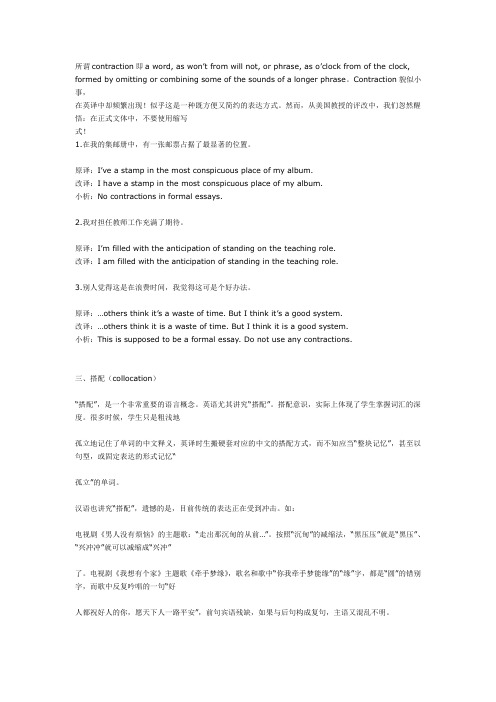
所谓contraction即a word, as won’t from will not, or phrase, as o’clock from of the clock, formed by omitting or combining some of the sounds of a longer phrase。
Contraction貌似小事,在英译中却频繁出现!似乎这是一种既方便又简约的表达方式。
然而,从美国教授的评改中,我们忽然醒悟:在正式文体中,不要使用缩写式!1.在我的集邮册中,有一张邮票占据了最显著的位置。
原译:I’ve a stamp in the most conspicuous place of my album.改译:I have a stamp in the most conspicuous place of my album.小析:No contractions in formal essays.2.我对担任教师工作充满了期待。
原译:I’m filled with the anticipation of standing on the teaching role.改译:I am filled with the anticipation of standing in the teaching role.3.别人觉得这是在浪费时间,我觉得这可是个好办法。
原译:…others think it’s a waste of time. But I think it’s a good system.改译:…others think it is a waste of time. But I think it is a good system.小析:This is supposed to be a formal essay. Do not use any contractions.三、搭配(collocation)“搭配”,是一个非常重要的语言概念。
“短平快”汉译英练习Mini-essay Translation from Chinese into English
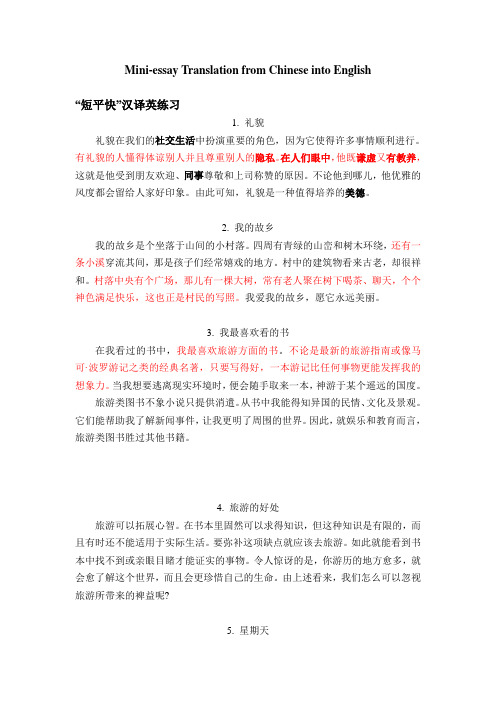
Mini-essay Translation from Chinese into English“短平快”汉译英练习1. 礼貌礼貌在我们的社交生活中扮演重要的角色,因为它使得许多事情顺利进行。
有礼貌的人懂得体谅别人并且尊重别人的隐私。
在人们眼中,他既谦虚又有教养,这就是他受到朋友欢迎、同事尊敬和上司称赞的原因。
不论他到哪儿,他优雅的风度都会留给人家好印象。
由此可知,礼貌是一种值得培养的美德。
2. 我的故乡我的故乡是个坐落于山间的小村落。
四周有青绿的山峦和树木环绕,还有一条小溪穿流其间,那是孩子们经常嬉戏的地方。
村中的建筑物看来古老,却很祥和。
村落中央有个广场,那儿有一棵大树,常有老人聚在树下喝茶、聊天,个个神色满足快乐,这也正是村民的写照。
我爱我的故乡,愿它永远美丽。
3. 我最喜欢看的书在我看过的书中,我最喜欢旅游方面的书。
不论是最新的旅游指南或像马可·波罗游记之类的经典名著,只要写得好,一本游记比任何事物更能发挥我的想象力。
当我想要逃离现实环境时,便会随手取来一本,神游于某个遥远的国度。
旅游类图书不象小说只提供消遣。
从书中我能得知异国的民情、文化及景观。
它们能帮助我了解新闻事件,让我更明了周围的世界。
因此,就娱乐和教育而言,旅游类图书胜过其他书籍。
4. 旅游的好处旅游可以拓展心智。
在书本里固然可以求得知识,但这种知识是有限的,而且有时还不能适用于实际生活。
要弥补这项缺点就应该去旅游。
如此就能看到书本中找不到或亲眼目睹才能证实的事物。
令人惊讶的是,你游历的地方愈多,就会愈了解这个世界,而且会更珍惜自己的生命。
由上述看来,我们怎么可以忽视旅游所带来的裨益呢?5. 星期天对我而言,星期天是宝贵的时间。
说得更精确一点,星期天对我来说是种奢侈的享受,因为我现在是大学四年级的学生,周一到周五都忙于繁重的课业,只有星期天才能改变一下生活步调,做自己喜欢做的事。
我是个内向的人,不像其他人喜欢爬山,游泳等户外活动。
中英文对照翻译文章
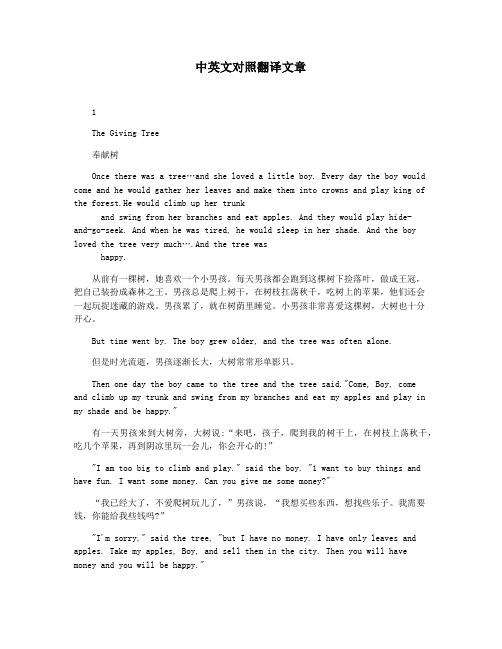
中英文对照翻译文章1The Giving Tree奉献树Once there was a tree…and she loved a little boy. Every day the boy would come and he would gather her leaves and make them into crowns and play king of the forest.He would climb up her trunkand swing from her branches and eat apples. And they would play hide-and-go-seek. And when he was tired, he would sleep in her shade. And the boy loved the tree very much….And the tree washappy.从前有一棵树,她喜欢一个小男孩。
每天男孩都会跑到这棵树下捡落叶,做成王冠,把自已装扮成森林之王。
男孩总是爬上树干,在树枝扛荡秋千,吃树上的苹果,他们还会一起玩捉迷藏的游戏。
男孩累了,就在树荫里睡觉。
小男孩非常喜爱这棵树,大树也十分开心。
But time went by. The boy grew older, and the tree was often alone.但是时光流逝,男孩逐渐长大,大树常常形单影只。
Then one day the boy came to the tree and the tree said."Come, Boy, come and climb up my trunk and swing from my branches and eat my apples and play in my shade and be happy."有一天男孩来到大树旁,大树说:“来吧,孩子,爬到我的树干上,在树枝上荡秋千,吃几个苹果,再到阴凉里玩一会儿,你会开心的!”"I am too big to climb and play." said the boy. "1 want to buy things and have fun. I want some money. Can you give me some money?"“我已经大了,不爱爬树玩儿了,”男孩说,“我想买些东西,想找些乐子。
汉英翻译:各种文体的翻译Essay translation from Chinese into English

汉英翻译:各种文体的翻译-- 散文、论说文的翻译I 提示·原文来源《师说》作者为韩愈(唐,768-824)。
原文语篇选自吴功正主编,1987年,《古文鉴赏辞典》。
南京:江苏文艺出版社。
·译文来源(1) 译文1选自戴抗选、谢百魁译,1996年,《中国历代散文一百篇》。
北京:中国对外翻译出版公司。
(2)译文2选自中国文学出版社编, 1998年,《中国文学·古代散文卷》汉英对照,外语教学与研究出版社。
(3 )译文3为罗经国译,选自《英语学习》2003年第9期。
(注;译文1、2、3因原文版本差异而引起的译文差异不在全面分析之列。
)·语体特征与翻译策略(1)篇章《师说》是一篇文字短、逻辑性强、结构严谨的议论文。
文章从正反两个方面论述了从师之道,是针对当时社会上“耻于从师”的不良风气而作的。
文章先以“师者所以传道、授业、解惑”肯定了师的作用,继而又从“闻道有先后”的角度说明从师不应有贵贱长幼之分。
(2)句式古代汉语的文章多使用短句,很少使用长句。
不过韩愈文章中的长句却比同时代的人突出。
在英语中,长句的使用可以增加文体的正式性、严肃性和科学性,而长句的这种文体作用同样也存在于汉语之中。
这都是因为长句更便于表达严密的逻辑或缜密的思想。
《师说》一文虽然突出地使用过长句,但是其句式在总体上都具长短相间的特点,以凸显其行文的灵活与变化,增加其文章的气势与说服力。
(3)语义作为古代散文的开派人物,韩愈重视文章主旨的新创见,叙述的新见解,语言的新技法。
后人在评价韩愈在语言的继承和发展上贡献尤其卓越。
“唯陈言之务去”,变成在学习唐宋古文创作在语言上的一条标准。
与其他古代散文家相比,韩愈的文章语言特点之一是:一般比较少使用虚字,文句在大体整齐的前提下,又具有长短错落、韵白相间的多样美。
(4)翻译策略对偶结构是汉语话语组织的一种重要形式,也汉语文字所特有的技巧。
早在六朝时期,骈文就是词句整齐对偶的文体。
大学英语四六级翻译写作常见中国传统文化英汉对照

大学英语四六级翻译写作常见中国传统文化英汉对照下面呢我整理了一部分四六级翻译写作常见的一些词,可能不算太多,但你能把下面这些都掌握了还是不错的。
毕竟我当初也是记得这些,也高分过了。
学习不是一朝一夕就能完成的,需要长期积累!祝你们逢考必过!!!你懂得,开动吧!1.舞龙dragon dance2.十二生肖Chinese zodiac3.剪窗花cut window grilles4.西游记Journey to the West5.红楼梦A Dream of Red Mansions6.三国演义The Romance of the there Kingdoms7.水浒传Water margin8.中国文学四大经典小说the Four Great Classical Novels of Chinese literature9.指南针the compass10.火药gunpowder 11.印刷术printing12.造纸术paper-making 13.中国古代四大发明the four great inventions of ancient China 14.象形文字pictographic characters15.秧歌the Yangko dance 16.诗经The Book of Songs17.史记Historical Records 18.对联couplets19.雄黄酒realgar wine 20.四世同堂four generations living under one roof 21.毛笔Chinese brush 22.宣纸xuan paper23.书法calligraphy 24.刺绣embroidery25.木偶戏puppet show 26.皮影戏shadowplay。
中英对照全译本
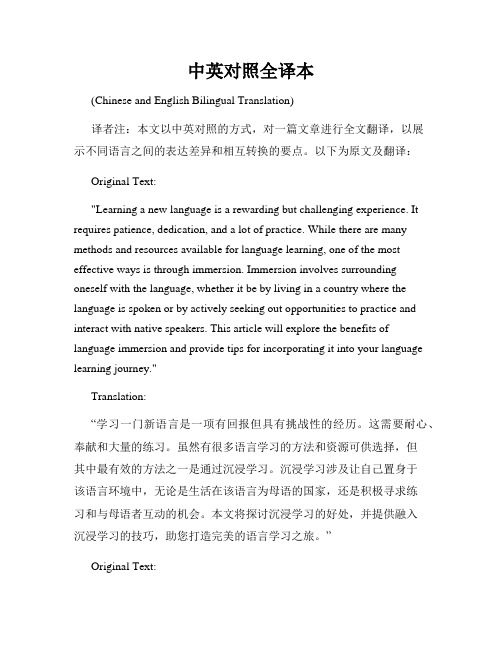
中英对照全译本(Chinese and English Bilingual Translation)译者注:本文以中英对照的方式,对一篇文章进行全文翻译,以展示不同语言之间的表达差异和相互转换的要点。
以下为原文及翻译:Original Text:"Learning a new language is a rewarding but challenging experience. It requires patience, dedication, and a lot of practice. While there are many methods and resources available for language learning, one of the most effective ways is through immersion. Immersion involves surrounding oneself with the language, whether it be by living in a country where the language is spoken or by actively seeking out opportunities to practice and interact with native speakers. This article will explore the benefits of language immersion and provide tips for incorporating it into your language learning journey."Translation:“学习一门新语言是一项有回报但具有挑战性的经历。
这需要耐心、奉献和大量的练习。
虽然有很多语言学习的方法和资源可供选择,但其中最有效的方法之一是通过沉浸学习。
英汉文体翻译
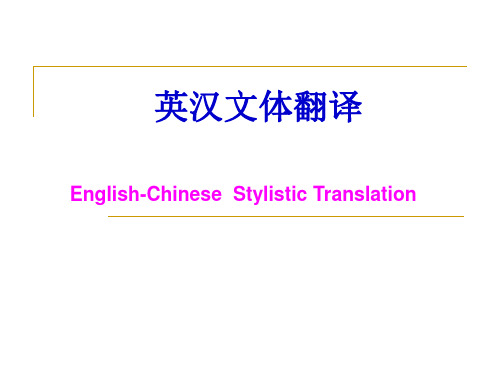
[2]"No good," he muttered," 'er'll never take to it now. ' [3]"Bring it down to the house," I said. "We'll give it a bottle." [2]“不妙,”他自言自语地说到,“她不会认 不妙, 他自言自语地说到, 不妙 它了。 它了。” [3] “把它弄到屋里来吧,”我说,“咱们用奶 把它弄到屋里来吧, 我说, 把它弄到屋里来吧 瓶喂它。 瓶喂它。”
[5] “ Pore little thing, you‘ll never rear it! ”’ she said,
with the typical lugubriousness(悲伤)of a domestic. She warmed a little milk while I fetched some brandy, and we gave it sips from a spoon. It revived with astonishing rapidity.
[4]Charlie carried it tenderly into the kitchen; it was astonishing how tender his rough hands could be with an ailing creature. and how dexterously he handled the mite. It was now too cold and weak to lift up its head, let alone stand. Together we warmed it by the fire, while the cook stood by, pityingly. [4] 查理小心地把它抱到厨房里。令人惊奇的是,在 查理小心地把它抱到厨房里。令人惊奇的是, 照料一只生病的小动物的时候, 照料一只生病的小动物的时候,查理的一双粗手有多 么温柔,他伺候小家伙,有多么熟练。小家伙又冷又 么温柔,他伺候小家伙,有多么熟练。 弱,连头也抬不起来,更不要说站着了。我们两个人 连头也抬不起来,更不要说站着了。 一起让它在灶旁暖和起来,厨师站在一旁,显出怜悯 一起让它在灶旁暖和起来,厨师站在一旁, 样子。 样子。
- 1、下载文档前请自行甄别文档内容的完整性,平台不提供额外的编辑、内容补充、找答案等附加服务。
- 2、"仅部分预览"的文档,不可在线预览部分如存在完整性等问题,可反馈申请退款(可完整预览的文档不适用该条件!)。
- 3、如文档侵犯您的权益,请联系客服反馈,我们会尽快为您处理(人工客服工作时间:9:00-18:30)。
汉英翻译:各种文体的翻译-- 散文、论说文的翻译I 提示·原文来源《师说》作者为韩愈(唐,768-824)。
原文语篇选自吴功正主编,1987年,《古文鉴赏辞典》。
南京:江苏文艺出版社。
·译文来源(1) 译文1选自戴抗选、谢百魁译,1996年,《中国历代散文一百篇》。
北京:中国对外翻译出版公司。
(2)译文2选自中国文学出版社编, 1998年,《中国文学·古代散文卷》汉英对照,外语教学与研究出版社。
(3 )译文3为罗经国译,选自《英语学习》2003年第9期。
(注;译文1、2、3因原文版本差异而引起的译文差异不在全面分析之列。
)·语体特征与翻译策略(1)篇章《师说》是一篇文字短、逻辑性强、结构严谨的议论文。
文章从正反两个方面论述了从师之道,是针对当时社会上“耻于从师”的不良风气而作的。
文章先以“师者所以传道、授业、解惑”肯定了师的作用,继而又从“闻道有先后”的角度说明从师不应有贵贱长幼之分。
(2)句式古代汉语的文章多使用短句,很少使用长句。
不过韩愈文章中的长句却比同时代的人突出。
在英语中,长句的使用可以增加文体的正式性、严肃性和科学性,而长句的这种文体作用同样也存在于汉语之中。
这都是因为长句更便于表达严密的逻辑或缜密的思想。
《师说》一文虽然突出地使用过长句,但是其句式在总体上都具长短相间的特点,以凸显其行文的灵活与变化,增加其文章的气势与说服力。
(3)语义作为古代散文的开派人物,韩愈重视文章主旨的新创见,叙述的新见解,语言的新技法。
后人在评价韩愈在语言的继承和发展上贡献尤其卓越。
“唯陈言之务去”,变成在学习唐宋古文创作在语言上的一条标准。
与其他古代散文家相比,韩愈的文章语言特点之一是:一般比较少使用虚字,文句在大体整齐的前提下,又具有长短错落、韵白相间的多样美。
(4)翻译策略对偶结构是汉语话语组织的一种重要形式,也汉语文字所特有的技巧。
早在六朝时期,骈文就是词句整齐对偶的文体。
到了唐代,汉语对偶就发展到了相当高的水平。
韩愈为唐宋8大散文家之一,文章中自然多使用对偶,并且骈散相糅,《师说》中也是如此。
所以翻译《师说》时应该注意到文章中的对偶句,遇到对偶句时应该尽量运用Antithesis去对应。
总体上看,译文1使用的翻译策略都比较恰当地体现了原文的风格或美学追求。
II译法要点3.1自然段落的划分 3.2不妥的合译3.3选词:哲学的角度 3.4设问与Rhetorical Question3 .5对偶与Antithesis 3.6 顺译:SVOC主语从句句3.7 排比与Parallelism 3.8变通:转换(名词→形容词)3.9变通:叙事与表态 3.10顺译:SC复句3.11变通:重构 3.12句群的划分3.13变通:代词 3.14直译:数字的模糊性3.15风格:情态动词need 3.16原文断句与译文断句III原文与译文【原文】师说古之学者必有师。
师者,所以传道、受业、解惑也。
人非生而知之者,孰能无惑?惑而不从师,其为惑也,终不解矣。
生乎吾前,其闻道也,固先乎吾,吾从而师之;生乎吾后,其闻道也,亦先乎吾,吾从而师之。
吾师道也,夫庸知其年之先后生于吾乎?是故无贵无贱,无长无少,道之所存,师之所存也。
嗟乎!师道之不传也久矣,欲人之无惑也难矣。
古之圣人,其出人也远矣,犹且从师而问焉;今之众人,其下圣人也亦远矣,而耻学于师。
是故圣益圣,愚益愚。
圣人之所以为圣,愚人之所以为愚,其皆出于此乎?爱其子,择师而教之;于其身也,则耻师焉,惑矣!彼童子之师,授之书而习其句读者,非吾所谓传其道、解其惑者也。
句读之不知,惑之不解,或师焉,或不焉,小学而大遗,吾未见其明也。
巫医乐师百工之人,不耻相师。
士大夫之族,曰师、曰弟子云者,则群聚而笑之。
问之,则曰:“彼与彼,年相若也,道相似也。
位卑则足羞,官盛则近谀。
”呜呼!师道之不复,可知矣!巫医乐师百工之人,君子不齿,今其智乃反不能及,其可怪也欤!圣人无常师。
孔子师郯子、苌弘、师襄、老聃。
郯子之徒,其贤不及孔子。
孔子曰:“三人行,则必有我师。
”是故弟子不必不如师,师不必贤于弟子,闻道有先后,术业有专攻,如是而已。
李氏子蟠,年十七,好古文,六艺经传,皆通习之,不拘于时,学于余。
余嘉其能行古道,作《师说》以贻之。
【译文】译文1On TeachersAncient scholars certainly had teachers.A teacher is one who passes on the truth, imparts knowledge and solves puzzles. Man is not born with knowledge. Who can deny that he has puzzles? These would remain unsolved, should one refuse to be instructed by teachers.The men born before me surely know the truth before me, so I respect them as teachers, whereas those born after me may also know the truth before me, I likewise respect them as teachers. It is the truth that I endeavor to learn. Need I know beforehand whether my teacher was born earlier or later than I? Therefore, no distinction should be made between the noble and the humble or between the young and the old.Where lies the truth, there is a teacher.Alas, it is a long time since the admirable tone of respecting teachers ceased to pass on! How hard it would be to expect a man to be free of puzzle! Sages in old times outstripped by far the ordinary people. Nevertheless, they had teachers and asked them questions. Nowadays the multitude, though much inferior to sages, are ashamed of being instructed by teachers. As a consequence, sages become more sage,and ignoramuses more ignorant.The wisdom of the former and the stupidity of the latter----are they not all caused by this?Loving parents may select teachers to instruct their children. But when it comes to themselves, they feel it a disgrace to be taught by them. How wrong they must be! The teachers of their children only show them how to read a book sentence by sentence, not to be mentioned in the same breath as those whom I refer to as passing on the truth and solving puzzles. For lack of reading skills, one seeks the help of teachers, while for unsolved puzzles, one acts contrariwise. It is indeed learning the lesser but giving up the greater. I do not see its wisdom.Physicians,musicians and multifarious artisans are not ashamed of learning from each other. But among the gentlefolk the talk about the teachers and pupils wouldinvite laughter from a gathered company. When asked about the reason, they would say, “The one is equal to the other in age and knowledge.” To be instructed by a man of low social standing is regarded as a disgrace, and by a man of high official ranks as a flattery. Alas, it is only conceivable that the noble tone of respecting teachers is lost and hardly retrievable! Physicians, musicians and artisan are refused to be treated as equals by gentlefolks, yet these turn out to be less intelligent than those. Is it not strange?Sages have had no constant teachers. Confucius once learned from Tan Zi as well as from Chang Hong, Shi Xiang and Laozi, though Tan Zi and his like are not on a parity with him in wisdom. Confucius says: “Out of my two fellow-travellers one must be qualified to be my teacher.” Hence pupils are not necessarily inferior to teachers, and teachers need not always besuperior to pupils. Some may know the truth earlier or later than others and each has his own professional specialty----that is all!Li Pan, aged seventeen, is fond of ancient classical writings and has studied all the six arts and their commentaries. Not restrained by the current practice, he has learned from me. As I commend him for his being able to follow the old ways, I am writing this essay “On Teachers” for him.译文2On Teachers Since ancient times, to learn all men must have teachers, who pass on the truth and dispel ignorance. As men are not born wise, who can be free from ignorance? But ignorant men do not find teachers, they remain ignorant for ever. Some teachers may be born before me and have learned the truth before me; I should thereforelearn from them. Some may have been born after me, but learned the truth before me; I should also learn from them. As I seek the truth, I need not worry whether my teacher is my senior or junior. Whether he is noble or common, older or younger, whoever knows the truth can be a teacher.Alas, since men have long ceased learning from teachers it is hard not to be ignorant. The old sages were far superior to common men, yet they sought the truth from teachers. Most men of today are far below those sages, yet they think it shameful to learn. That is why sages become more sage, while fools more foolish. No doubt this is what makes some sages and others fools.A man who loves his son chooses a teacher for him but is ashamed to find one for himself. This is entirely wrong. All a child’s teacher can do is give him a book and tell him how to read it sentence by sentence. This is not the teacher I have inmind who can pass on the truth and dispel ignorance. If we want to learn to read but not to dispel ignorance, we are learning the lesser and giving up the greater, which is hardly intelligent.Physicians, musicians and artisans are not ashamed to learn from each other. But if one of the literati calls another man his teacher and himself pupil, people will flock to laugh at him. If you ask why, they will reply that the men are roughly equal in age and understanding. If one has a low social status, it is humiliating; if one is a high official, it looks like flattery. Clearly, to learn from a teacher is old-fashioned. Physicians, musicians and artisans are despised by gentlemen, yet they seem to be more intelligent. Is this not strange?A sage has more than one teacher. Thus Confucius learned from Tan Zi, Chang Hong, Shi Xiang and Lao Dan. Men like Tan Zi were inferior to Confucius, yetConfucius said, “Out of three men, there must be one who can teach me. ” So pupils are not necessarily inferior to their teachers, nor teachers better than their pupils. Some learn the truth earlier than others, and some have special skills----that is all.Li Pan, seventeen, is fond of ancient literature, and has studied the six arts, the classics and the commentaries, not confining himself to what is in vogue today. He has studied with me, and as I admire his respect for the old traditions I am writing this essay on teachers for him.译文3On the Teacher In ancient times those who wanted to learn would seek out a teacher, one who could propagate the doctrine, impart professional knowledge, and resolve doubts. Since no one is born omniscient, who can claim to have no doubts? If onehas doubts and is not willing to learn from a teacher, his doubts will never be resolved. Anyone who was born before me and learned the doctrine before me is my teacher. Anyone who was born after me and learned the doctrine before me is also my teacher. Since what I desire to learn is the doctrine, why should I care whether he was born before me or after me? Therefore, it does not matter whether a person is high or low in position, young or old in age. Where there is the doctrine, there is my teacher.Alas! The tradition of learning from the teacher has long been neglected. Thus it is difficult to find a person without doubts at all. Ancient sages, who far surpassed us, even learned from their teachers. People today, who are far inferior to them, regard learning from the teachers as a disgrace. Thus, wise men become wiser and unlearned men becomemore foolish. This explains what makes a wise man and what makes a foolish man.It is absurd that a person would choose a teacher for his son out of his love for him, and yet refuse to learn from the teacher himself, thinking it a disgrace to do so. The teacher of his son teaches the child only reading and punctuation, which is not propagating the doctrine or resolving doubts as the aforementioned. I don’t think it wise to learn from the teacher when one doesn’t know how to punctuate, but not when one has doubts unresolved, for that I find to be the folly of learning in small matters, but neglecting the big ones. Even medicine men, musicians and handicraftsmen do not think it disgraceful to learn from each other. When one of the literati calls another man his “teacher”and himself his “student”, people will get together and invariably laugh at him. If you ask them why they are laughing, theywill say that since he is almost of the same age and as erudite as another man, it would be a disgrace for him to call the other man “teacher”, if the other man’s social rank is lower than his; and it would be flattering if the other man’s social rank is higher. Alas! It is clear that the tradition of learning from the teacher can no longer be restored. Medicine men, musicians and handicraftsmen are despised by the gentlemen. How strange it is that gentlemen are less wise than these people!The ancient sages did not limit themselves to particular teachers. Confucius had learned from people like Tanzi, Changhong, Shixiang, and Laodan, who were not as virtuous and talented as Confucius. Confucius said,”If three men are walking together, one of them is bound to be good enough to be my teacher.”A student is not necessarily inferior to his teacher, nor does a teacher necessarily bemore virtuous and talented than his student. The real fact is that one might have learned the doctrine earlier than the other, or might be a master in his own special field.Pan, the son of Li’s family, who is only seventeen years old, loves to study Chinese classics of the Qin and Han dynasties, and masters the six jing and their annotations. He does not follow conventions and is willing to learn from me. I appreciate his ability to act in accordance with the old tradition of learning. Therefore I dedicate this piece to him.IV比较分析与译法(1)《师说》全文3.1自然段落的划分如王力所言(1985:393):“现代文章的书写格式,大致也是模仿西文的。
